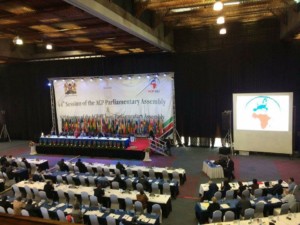
The plenary session of the ACP-EU Joint Parliamentary Assembly in Nairobi
From 19 to 21 December, hundreds of parliamentarians from the European Union and from the African, Caribbean and Pacific (ACP) group of states gathered in Nairobi (Kenya) for the 32nd session of the ACP-EU Joint Parliamentary Assembly.
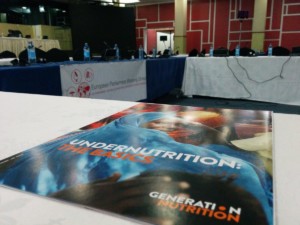 On 21 December, on the side of the official programme that included debates on migration, trade and demographic growth, Global Health Advocates organised and moderated a lunch debate to discuss the topic “Investing in Nutrition: The Foundation of Development”. The event was co-hosted by Julie Ward, a British Member of the European Parliament, and by Hon. Saoudatou Mamadou Wane, a member of the National Assembly of Mauritania, and saw the interventions of nutrition experts from Kenyan civil society: Jacob Korir, from the Micronutrient Initiative, and Titus Mung’ou, from the Emergency Nutrition Network.
On 21 December, on the side of the official programme that included debates on migration, trade and demographic growth, Global Health Advocates organised and moderated a lunch debate to discuss the topic “Investing in Nutrition: The Foundation of Development”. The event was co-hosted by Julie Ward, a British Member of the European Parliament, and by Hon. Saoudatou Mamadou Wane, a member of the National Assembly of Mauritania, and saw the interventions of nutrition experts from Kenyan civil society: Jacob Korir, from the Micronutrient Initiative, and Titus Mung’ou, from the Emergency Nutrition Network.
Every year, malnutrition claims the lives of 3 million children under the age of five and costs the global economy billions of dollars. Still, those losses are almost entirely preventable by effectively investing in early childhood development and improving nutrition during the first 1,000 days of children’s lives. According to a research published in 2016 by the World Bank, an additional annual investment of $7 billion over the next 10 years is needed to reach global nutrition targets. In addition, estimations also show that every dollar invested in early childhood development programs can generate a return of between 6 and 17 dollars: nutrition investments represent one of the most cost-effective interventions governments can make in their country’s future.
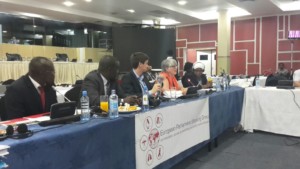
From left to right: Jacob Korir (Micronutrient Initiative), Titus Mung’ou (Emergency Nutrition Network), Gian Marco Grindatto (Global Health Advocates), MEP Julie Ward, Hon. Saoudatou Wane
The debate focused on the key role parliamentarians have to play in this context: in countries heavily affected by malnutrition, they can advance the well-being of their constituencies by crafting legislation, voting budget and holding their governments accountable for the commitments made. In donor countries, parliamentarians can leverage additional funding for nutrition and shape effective development policies that can have a positive impact on early childhood development in partner countries.
Speakers underlined how 2017 presents many opportunities, both at global and regional level, when nutrition and early childhood development can feature high in the political agenda and commitments can be taken: World Health Assembly, the SUN Movement Global Gathering, the World Bank spring and fall meetings, the G7 Summit in Italy to name only few.
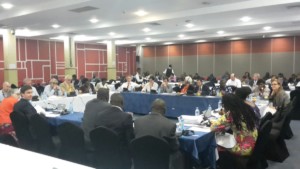
Full room: parliamentarians discussing their role in advancing nutrition
Julie Ward shared her experience and commitments as MEP, reminding that the EU is already a top player in the fight against undernutrition, with a robust Nutrition 4 Growth pledge of €3.5 billion dedicated to nutrition interventions. Still, this is not enough and the funding gap remains huge. She called on the EU to increase nutrition specific investments to €1bn by 2020, as enshrined in a 2016 resolution of the European Parliament. She also underlined, quoting a blog post she wrote few months ago, that many EU development sectors are relevant for nutrition policies: agriculture, education, gender and health programmes can all have nutrition components and can contribute to the fight against undernutrition.
Ms. Saoudatou Mamadou Wane presented the perspective of parliamentarians from countries affected by high undernutrition rates: MPs can promote nutrition advocacy initiatives, to push government to allocate more funds for the fight against malnutrition. In particular, she committed to deliver to the government a civil society letter concerning the fight against undernutrition in Western Africa, with specific asks about the need for more nutrition investments.
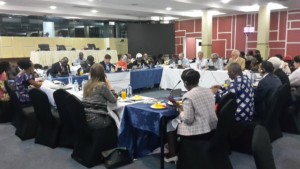
Debate between parliamentarians: what they can do to promote effective nutrition policies
During the debate that followed, MPs from different African countries took the floor to share their experiences in advancing the nutrition agenda in their constituencies. Esther Matiko, an MP from Tanzania, presented the example of her country, where there is a strong commitment from the government, the Parliament and CSOs in the fight against undernutrition. Within the National Assembly, an existing parliamentary network has been able to pass nutrition-friendly legislation, including bills regarding breastfeeding facilities and maternity leave extension.
Other experiences were shared by MPs from Uganda, Juliet Suubi Kyinyamatama and Cecilia Atim Ogwal, who underlined how their country has undertaken a big awareness campaign on nutrition, with the importance of targeting women and girls in particular: women have a key role to play and must be involved around nutrition issues.
The event saw the active participation of 12 members of the European Parliament together with around 40 MPs from ACP countries, who showed real commitments in advancing nutrition policies in their respective constituencies.
Global Health Advocates will build on this commitments, continuing to mobilise parliamentarians in the fight against malnutrition and facilitating networks of MPs willing to do their part in promoting nutrition.
If you want to know more about this event and more generally about parliamentary engagement in the fight against undernutrition, please contact Gian Marco (GHA EU office) at gmgrindatto@ghadvocates.org.



